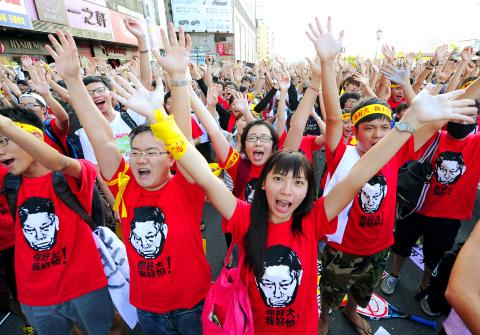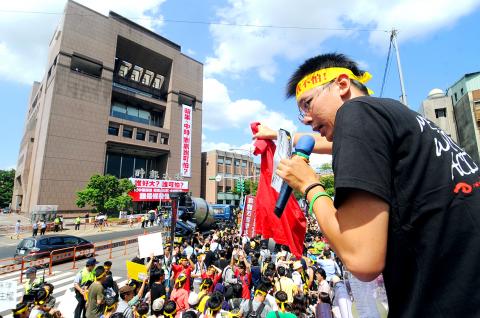Thousands of journalists, students, academics and social activists yesterday took to the streets in Taipei to protest against monopolization of the media and demanded that the National Communications Commission (NCC) help break monopolization of the media.
“No to monopolization of the media, protect professionalism in media,” thousands chanted as they marched from Want Want China Times Group (旺旺中時集團) headquarters to the NCC headquarters in Taipei.
Many of the demonstrators held home-made signs and placards with slogans against media monopolization or the Want Want China Times Group, such as “You’re big, but I’m not scared,” “I would like my news without additives” and “Non-professional media operators should go back to making biscuits.”

Photo: CNA
One woman taking part in the march wore a mask that looked like two hands covering her eyes and held a sign reading: “Media monopoly blinds my eyes.”
“We are gathered here because we are upset that [Want Want China Times Media Group chairman] Tsai Eng-ming (蔡衍明) used media outlets under the group as his own personal tool to attack his enemies. We’re also worried that when the group gets its hands on the largest cable TV service provider, it will be a disaster for the country,” Association of Taiwan Journalists (ATJ) chairwoman Chen Hsiao-yi (陳曉宜) told the crowd.
The ATJ, along with the Campaign for Media Reform, Taiwan Media Watch, the Alliance against Media Monsters and the Youth Alliance against Media the demonstration.

Photo: Lo Pei-der, Taipei Times
“We are here to demand our freedoms of expression and of media,” Chen said. “We call on Tsai to give up his merger plan with China Network Systems (CNS, 中嘉網路).”
Chen was referring to a Want Want plan to acquire some of the cable TV services owned by CNS, the largest cable TV service provider in the country, that was conditionally approved by the NCC last month.
The merger plan has worried many because the Want Want China Times Group already owns several media outlets, including newspapers, a magazine, TV channels and a radio station. Opponents worry that if Want Want buys CNS’ cable TV services, it may be able to interfere with other media outlets, with the power to decide which channels may be broadcast via cable.
The issue did not attract too much public attention until last month, when all media outlets under the group launched a series of reports accusing the Academia Sinica research fellow — who is a strong opponent to the merger case — of paying students to join anti-merger rallies, which was later proved to be false.
When one National Tsinghua University student, Chen Wei-ting (陳為廷), questioned Want Want’s motives, he also became a target of criticism by media outlets under the group.
“CtiTV [of the Want Want China Times Media Group] aired news reports criticizing me 24 hours a day during that time, and each news report could take as long as 15 minutes of air time,” Chen Wei-ting said. “This shows how horrible things could get when a media group has a monopoly.”
Some foreign students also joined the march.
Chong Yee-shan (張玉珊), from Malaysia, said she joined because media monopoly is also a serious problem in her own country, especially in Chinese-language media outlets.
Several human rights groups, such as the Taiwan Association for Human Rights, the Deng Liberty Foundation, Taiwan Students for a Free Tibet, Taiwan Labor Front (TLF) and the Humanistic Education Foundation, participated.
“The media issue is important for social groups, especially those who are working for the rights of the disadvantaged in our society,” TLF secretary-general Son Yu-lian (孫友聯) said. “When all media outlets are in hands of big corporations, disadvantaged people will be silenced.”
Journalism students were among the most predominant groups in the march.
“I want to become a journalist when I finish school, so I am concerned about the work conditions for journalists,” said Kuo Chih-jung (郭芝榕), a student at National Taiwan University’s Graduate Institute of Journalism. “I would like to call on the government to help maintain the independence of media outlets.”
Another journalism student surnamed Lee (李) said she was concerned about how the awareness and energy of the demonstration could be maintained, so that real reform of the media could succeed.
The parade ended in front of the NCC headquarters, as the crowd called on the institution to make or revise laws to help maintain the independence of media outlets, which an NCC official who accepted a petition from ATJ head Chen Hsia-yi promised to help out.
In response, Want Want China Times Group published a full-page advertisement in the China Times yesterday asking: “Who is big? Who is scared?”
“Our news reporting has been always professional and can be scrutinized. We welcome all criticism,” the advert said.
Additional reporting by CNA

DAREDEVIL: Honnold said it had always been a dream of his to climb Taipei 101, while a Netflix producer said the skyscraper was ‘a real icon of this country’ US climber Alex Honnold yesterday took on Taiwan’s tallest building, becoming the first person to scale Taipei 101 without a rope, harness or safety net. Hundreds of spectators gathered at the base of the 101-story skyscraper to watch Honnold, 40, embark on his daredevil feat, which was also broadcast live on Netflix. Dressed in a red T-shirt and yellow custom-made climbing shoes, Honnold swiftly moved up the southeast face of the glass and steel building. At one point, he stepped onto a platform midway up to wave down at fans and onlookers who were taking photos. People watching from inside

MAKING WAVES: China’s maritime militia could become a nontraditional threat in war, clogging up shipping lanes to prevent US or Japanese intervention, a report said About 1,900 Chinese ships flying flags of convenience and fishing vessels that participated in China’s military exercises around Taiwan last month and in January last year have been listed for monitoring, Coast Guard Administration (CGA) Deputy Director-General Hsieh Ching-chin (謝慶欽) said yesterday. Following amendments to the Commercial Port Act (商港法) and the Law of Ships (船舶法) last month, the CGA can designate possible berthing areas or deny ports of call for vessels suspected of loitering around areas where undersea cables can be accessed, Oceans Affairs Council Minister Kuan Bi-ling (管碧玲) said. The list of suspected ships, originally 300, had risen to about

A Vietnamese migrant worker yesterday won NT$12 million (US$379,627) on a Lunar New Year scratch card in Kaohsiung as part of Taiwan Lottery Co’s (台灣彩券) “NT$12 Million Grand Fortune” (1200萬大吉利) game. The man was the first top-prize winner of the new game launched on Jan. 6 to mark the Lunar New Year. Three Vietnamese migrant workers visited a Taiwan Lottery shop on Xinyue Street in Kaohsiung’s Gangshan District (崗山), a store representative said. The player bought multiple tickets and, after winning nothing, held the final lottery ticket in one hand and rubbed the store’s statue of the Maitreya Buddha’s belly with the other,

Japan’s strategic alliance with the US would collapse if Tokyo were to turn away from a conflict in Taiwan, Japanese Prime Minister Sanae Takaichi said yesterday, but distanced herself from previous comments that suggested a possible military response in such an event. Takaichi expressed her latest views on a nationally broadcast TV program late on Monday, where an opposition party leader criticized her for igniting tensions with China with the earlier remarks. Ties between Japan and China have sunk to the worst level in years after Takaichi said in November that a hypothetical Chinese attack on Taiwan could bring about a Japanese